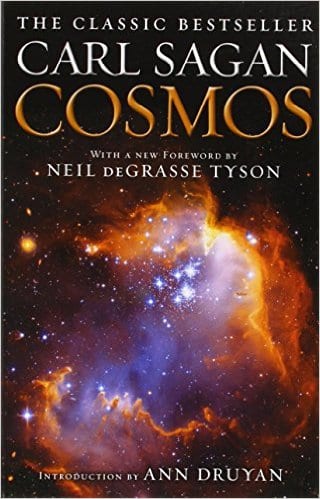In an earlier blog post, I explained how Carl Sagan's COSMOS changed my life. And now years later, I gave the book another read-through, and this a review of that book.
After finishing this recent read-through, I'm now pretty sure that in the early 80s when I received the original, I had not ever read through the entire book. I had only looked at all the many pictures that existed in that first hardbound edition. And the pictures had reminded me of the 13 episodes I had watched of the partner TV show: Cosmos: A Personal Voyage. So, it turns out, it was really the TV show that changed my life, and not the book.
The book, itself, is slightly different from the show -- maybe about 70% overlap, but then another 30% of stuff I hadn't heard before. The show also has some of my favorite pieces that are missing in the book.
Overall, Sagan's book is well-organized -- 13 chapters. He begins by defining the word Cosmos. It is the order in which we live -- our universe -- the opposite of chaos. He then describes our place in the whole. He explores how our understanding of the Cosmos changed throughout time, including our advances in knowledge and setbacks (he doesn't seem to like Pythagoras that well). He explores our planets, detailing our missions to explore them. He describes our own planet and how we need to take care of it. He muses on the possibility of life around other stars and how we may eventually meet others. He discusses a lot about how evolutional forces helped to shape our existence -- how it took billions of years to build what we have now. He explains how everything we see in space is a time machine back into the past.
And he finishes it all with the most chilling chapter: "Who Speaks for Earth?" If we are to survive, we must come together, but due to the "reptile" inner brains we have, we also have the disposition to destroy ourselves. He urges that we need to learn how to use our "mammal" outer brains to overcome our instincts to destroy, and then persevere into the future.
I, for one, am optimistic that we will figure it all out and survive this destructive period, even though these last few years have been very unsettling -- if Carl Sagan was worried in the late 70s, he would certainly be alarmed to see how worse off we are today -- how bad actors have used the internet to brainwash many unknowing victims to embrace their destructive natures and increase hate. Something I'm actively fighting, but not gaining much traction yet. Carl Sagan and others have inspired me to push our world as much as I can in the right direction -- as large as that world is.
There are definitely parts where I disagree with the man. For example, Sagan spends a few pages talking about how letting teenagers have unlimited sex would lead to more peaceful people as adults (based on the research of neuropsychologist James W. Prescott) -- and I'm all: "Say what? This is interesting but you're certainly spending a lot of time on this one." So -- he's not perfect, and sometimes he'll drift on some strange tangent.
Also, some parts are a little dated, but we can't really fault him on that.
However, more often than not, I find myself agreeing with him, and so I strongly recommend this book. 5 stars out of 5. There's a lot of history I didn't know before, and he made it all interesting. There are very deep concepts that make me think, and maybe it can get your brain working as well. So -- give it a try.

No comments:
Post a Comment